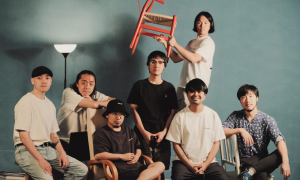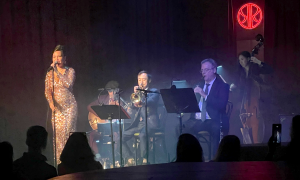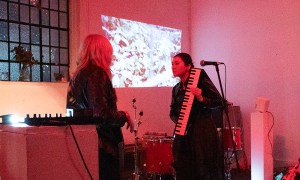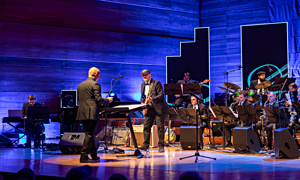Home » Jazz Articles » Live Review » The Allman Brothers Band: The Road Goes on Through 2004
The Allman Brothers Band: The Road Goes on Through 2004
How miraculous it seems to hear musicianship from the current ABB lineup with the same intelligence, invention and passion as the original lineup.
In contrast to the magnificent expanse of the August 21st show, The Allmans played it comparatively conservatively in New Hampshire. Extended jamming was confined to "Rockin' Horse,"—sung by Haynes and driven to feverish levels through his guitar interplay with Derek Trucks—the laidback Latin shuffle midsection of the otherwise languorous "Desdemona" and the archetypal Allman swagger that is "Instrumental Illness," where Jaimoe, Butch Trucks and Marc Quinones took a break that left you wanting more!?!?! Otherwise the superbly-paced two and one-half hours of music was confined to a rapid-fire succession of set pieces rendered in what might be considered definitive, albeit compact, readings: "Done Somebody Wrong," "Statesboro Blues" and the terrifically high-spirited set closer "Revival" (played more and more often as this summer progresses).
A mere set list, however, cannot convey the momentum ABB generated as they played. Nor can it accurately depict the high contrast the band created by juxtaposing the propulsive slashing shuffle and deep blues hues of "Don't Want You No More/"It's Not My Cross to Bear" with the gentle pastels and floating quality that emanated from "Ain't Wastin' Time No More." All of which was done without any faux showmanship to interfere with the inherent drama of making music: it's riveting to watch Derek Trucks as patiently builds a solo, methodically interweaving ideas until his playing virtually bursts into flaming intensity.
In what was just the beginning of a stark comparison of two consecutive concerts, The Allmans could've hardly started their show in Massachusetts with a bigger surprise than "Mountain Jam:" easing gently into the lilting theme as the band picked up speed and power, it was more than a little courageous, given the rabid rowdy crowd in front of them that might not have all the patience in the world. But this set evolved into something of a summary of all the best moments The Allman Brothers first unveiled upon the stage of New York's Beacon theater this past March, consisting of lengthy improvisations combined with a clutch of cover tunes, all of which was cemented together by a series of astutely positioned signature songs, leading right up to and including an encore that satiated the audience and the band(Haynes and Allman heartily shook hands to congratulate each other when the music was finally over).
Always the bellwether of The Brothers, the night before Gregg Allman had taken an exquisitely slow turn through "Melissa," while Warren played the most bittersweet guitar accompaniment behind his world-weary voice. In Massachusetts, the group's namesake turned The Band's "The Night They Drove Old Dixie Down" into a personal statement(as well as an ode to his Southern heritage) :when he so poignantly sang the lines "like my brother before me/I'm a workin' man." Recalling the high-spirits and light-touch inherent in "Jessica, " Warren then led the group on a gallop through "Why Does Love Got to be So Sad" and the exhilaration The Allmans generated throughout the Tweeter at this point became even more palpable when they oh-so-gracefully transformed the Derek & the Dominos tune into Grateful Dead's "Franklin's Tower," which was sung with equal parts relish and delight by Oteil Burbridge; the young bassist who has become the band's unsung hero and secret weapon( based not just on how often he accurately anticipates the other members of the band in such interludes, but also those intuitive his call-and-responses with Haynes.
It was hard to tell whether it was the musicians or the audience more ecstatic at this point, which was perhaps why Dr. John's ominous "I Walk on Gilded Splinters" came off somewhat ragged: conflicting with the mood of the moment, it was not the best choice of songs at this point in the set. But a romp through "Trouble No More" became the flashpoint for the fiery final thirty-plus minutes of the set. Typical of The Allman Brothers' reinvention of their music over the last few years, the sweetest imaginable segue connected "Dreams" and "In Memory of Elizabeth Reed," revealing the similarities in structure and melody in these two tunes. The Dickey Betts song included an extended drum break during which each of the three percussionists took turns establishing a rhythm pattern the others embellished, just before Derek introduced "Afro Blue," the embroidering of which theme by the rest of band became an acknowledgment of Coltrane's influence on the composition as well as some homage to the long-standing contributions of the now departed guitarist. It is difficult to imagine more empathy or intensity shared by a group of musicians, none of whom overplay or attempt to outplay each other, but then came a redux of "Mountain Jam, " during which crescendo, as with so many other familiar ABB tunes, the current lineup refuses to try and duplicate the original recordings, but rather inject the music with their own by now well-defined personality.
Given the mental concentration and physical exertion required for close to two hours of non-stop playing, the temperance the band demonstrated the previous night in New Hampshire stood them in good stead for a furious 12-minutes plus encore of "Whipping Post," that, predictable as it might've been, cemented the impression of ABB as a certifiably great band. How else to describe a unit that can play with such informed discipline one night, then open themselves up to the spirit of the moment the next—and be equally successful at each approach? This sort of performance is but an extension of the consolidation of a chemistry that includes new-found assets, like Oteil's growing authority and initiative, as well as the retooling of long-standing virtues, such as the tandem playing of Haynes and Trucks. And you have to assume the positive recognition given the The Allmans' recently is truly hitting home when Gregg Allman becomes as demonstrative as he did during "One Way Out" at Meadowbrook: at this venue the great views afforded by the dual video screens showed how often Gregg lets a sly smile creep into his usually taciturn demeanor as he watches Derek stoically embark on a spontaneously combustible solo.
A series of Instant Live CD's—recorded and sold at the venue itself the night of the show distributeded at a half-dozen shows during last summer's tour(available via ABB merchandising at www.hittinthenote.com) give a glimpse into such utter brilliance as displayed in Mansfield. Following their group instincts to learn how best to construct sets that highlight their collective virtues, The Allman Brothers bring increasing muscle to songs from last year's splendid studio work Hittin' the Note , such "High Cost of Low Living," without sacrificing any nuance or undercutting the impact of familiar material like "You Don't Love Me." And, as with the August 20th show this year, the daring with which the Brothers exhumed such terrific, but rarely played in recent memory chestnuts like "Don't Keep Me Wonderin'," is equaled by the invigorating rearrangement of well-known tunes "Southbound" now sounding as if it were written for a brassy horn section to begin with. In the form of "The Same Thing" and "Good Morning Little Schoolgirl," both fronted, tellingly, by Warren Haynes, the blues remain an eternal source of inspiration for The Brothers, which is no doubt why Gregg's most impressive vocal of the August 21st performance just outside Boston was when he became the lead singer of a bluesband deluxe on "Key to the Highway, " alternately caterwauling and crooning with as much confidence as aplomb. The same deep sense of fearlessness and adventure as displayed by ABB in this summer of 2004 is what made The Allman Brothers Band famous in the first place. And, as the band itself has found its bearings again early in the new millennium—and arguably become as full of fire, finesse and imagination as the original lineup—the album that turned into a landmark in rock history, Live at Fillmore East (Universal Music Enterprises), has also become one of a series of defining moments for one of, if not the most, resilient group in the history of rock.
Originally released on two vinyl LP's, this album in its original seven-track format has withstood repeated attempts to improve it, through the use of updated technology as well as the addition of tracks recorded at the fables venue at or around the same time—see The Fillmore Concerts and/or Fillmore The Deluxe Edition (both two-CD sets on UME). But it's only now, with the production of the album in SACD hybrid disc format, that the actual improvement has taken place. With the bass of Berry Oakley almost as prominent in its resounding grace as the scintillating dual guitars of Duane Allman and Dickey Betts, and the double drummers Jaimoe and Butch Trucks not far behind, there's a presence in the sound here that makes it seem it was produced and recorded by ABB's current engineering team.
 Oddly, or perhaps not, given this group's grasp of subtlety, it's the quieter moment of the Live at the Fillmore SACD that hit home most potently: during the majestic swell of sound near the finish of "You Don't' Love Me" and the dream-like interlude near the end of "Whippin' Post," just before you hear Gregg's final ghostly wail. And say what you will about the way original producer Tom Dowd constructed what he considered 'hot" takes of various performances of, for instance, "Elizabeth Reed," for the sake of the initial release (the great virtue of Instant Live CDs?: no overdubs!), it becomes all the more astounding to hear what you may know by heart, in this pristine clarity, and then move on to compact discs recorded right at venues where The Brothers are currently playing: Tweeter's three-disc set confirms all that you knew to be true about that magical night. So, how miraculous it seems to hear musicianship that possesses the same invention, intelligence and passion as the album that, immediately esteemed as The Allman Brothers Band's best work upon its release, has become something of a cultural milestone as well as the definitive live rock concert recording.
Oddly, or perhaps not, given this group's grasp of subtlety, it's the quieter moment of the Live at the Fillmore SACD that hit home most potently: during the majestic swell of sound near the finish of "You Don't' Love Me" and the dream-like interlude near the end of "Whippin' Post," just before you hear Gregg's final ghostly wail. And say what you will about the way original producer Tom Dowd constructed what he considered 'hot" takes of various performances of, for instance, "Elizabeth Reed," for the sake of the initial release (the great virtue of Instant Live CDs?: no overdubs!), it becomes all the more astounding to hear what you may know by heart, in this pristine clarity, and then move on to compact discs recorded right at venues where The Brothers are currently playing: Tweeter's three-disc set confirms all that you knew to be true about that magical night. So, how miraculous it seems to hear musicianship that possesses the same invention, intelligence and passion as the album that, immediately esteemed as The Allman Brothers Band's best work upon its release, has become something of a cultural milestone as well as the definitive live rock concert recording.
Tags
About Allman Brothers Band
Instrument: Band / ensemble / orchestra
PREVIOUS / NEXT
Support All About Jazz
 All About Jazz has been a pillar of jazz since 1995, championing it as an art form and, more importantly, supporting the musicians who make it. Our enduring commitment has made "AAJ" one of the most culturally important websites of its kind, read by hundreds of thousands of fans, musicians and industry figures every month.
All About Jazz has been a pillar of jazz since 1995, championing it as an art form and, more importantly, supporting the musicians who make it. Our enduring commitment has made "AAJ" one of the most culturally important websites of its kind, read by hundreds of thousands of fans, musicians and industry figures every month.





















